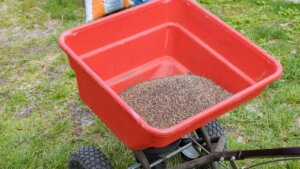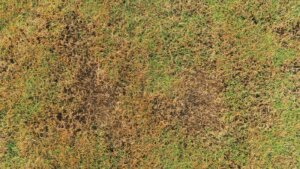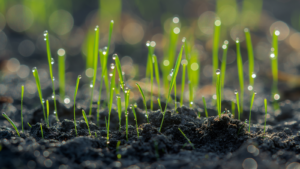Lawn care is essential to keeping your home’s exterior appearance flawless and in shape. However, many homeowners apply fertilizer to their lawns without realizing the potential dangers that it can cause. Namely, the potential for fertilizer burn on your home’s lawn is a significant issue for many homeowners.
If you are unsure why your lawn fertilizer burns your grass and want to fix this issue, you’re in luck. No more worrying about fertilizer burn–grass care solutions and future actions are described in this article.
Why Does Fertilizer Burn Grass?
Start by asking: why does fertilizer burn grass? Fertilizer burn occurs when using a fertilizer with high concentrations of salts that draw moisture from your grass. Certain fertilizers have concentrated salts that can cause burns on your lawn or other signs of damage like wilting or dying grass.
Burns might occur if you apply too much fertilizer to your lawn, if there is little moisture due to weather, or if you use specific fertilizers. Additionally, lawn burns occur when a fertilizer directs excess nitrogen to your lawn at one time, causing your grass to dry out. While it might not literally burn your grass, your lawn will appear burnt.
Fertilizer Burn Grass Care Solutions
Luckily, there are many ways to fix a fertilizer burn in your yard. The solution to burnt grass due to over-fertilization depends on the damage and burn caused to your grass. Homeowners can reduce fertilizer burns by rinsing their lawn soil with water, using a garden hose or sprinkler.
Additionally, if you can physically see the fertilizer on your lawn, begin clearing it from the grass and scooping as much as possible from your lawn. Depending on the size of the damaged area, consider removing the grass from your lawn in the affected spots. For instance, if only a tiny patch of grass is burned, you can rake it or mow over it to remove the grass from the soil. In some situations, depending on the level of damage, you may need to reseed your grass.
Can I Prevent Fertilizer Burn in the Future?
Thankfully, there are future steps you can take to prevent fertilizer burn. Grass care is essential to maintaining the healthiness and appearance of your lawn. First, consider using slow-release fertilizers rather than quick-release. While your lawn might require frequent fertilizing, slow-release fertilizers are less likely to build up and lead to fertilizer burn.
Additionally, ensure that you only apply fertilizer to dry grass. If you apply it to wet grass or plants, the fertilizer might burn your lawn. When you apply fertilizer to wet soil, you increase the risk of fertilizer burn.
If you use a granular fertilizer, guarantee that you rinse your grass with water after the fertilizer is applied. Rinsing your grass can eliminate excess fertilizer that will lead to grass burns if left untreated.
Find Expert Lawn Care & Fertilizer Solutions With Terra Lawn Care
Lawn fertilization is essential to keeping your home’s exterior appearance lush while preventing harmful weeds or damage to your grass. If you are uncertain why you’re experiencing grass burns or need expert fertilization services, Terra Lawn Care can help.
Terra Lawn Care offers expert lawn fertilization services to guarantee that your grass is healthy and sustainable. Contact the experts at Terra Lawn Care today if you need a solution for burnt grass or other solutions involving lawn fertilizer.



